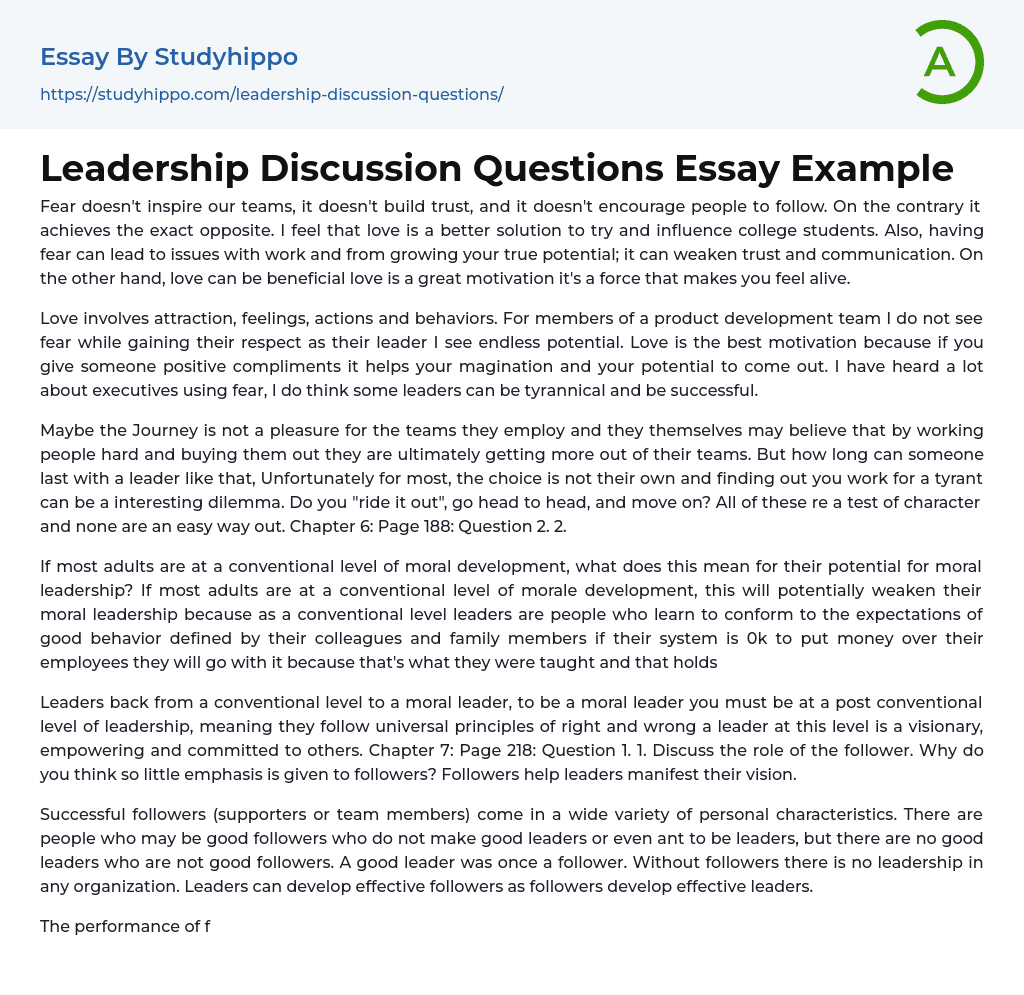Using fear as a motivation strategy, trust-building technique, and empowerment tool has the opposite effect. It is suggested to employ love instead, as it is a more effective method of influencing college students. Fear hinders progress, limits capabilities, and undermines trust and communication. Conversely, love serves as a powerful motivator that energizes individuals.
Love encompasses attraction, emotions, gestures, and conduct. As the leader of a product development team, I perceive boundless potential in gaining their respect rather than instilling fear. Love serves as the ultimate source of motivation, as offering positive compliments can stimulate creativity and unleash one's full potential. While I acknowledge that some leaders may resort to tyranny and achieve success, I have frequently encountered tales of executives employing fear as a means of control.
"justify">
Perhaps the teams they hire do not find the journey enjoyable and they may themselves believe that pushing their employees hard and buying them out will ultimately yield better results. However, working under a leader like that is hardly sustainable. Sadly, most individuals do not have a choice in the matter and discovering that you work for a tyrant can create a challenging predicament. Should you endure it, confront the situation head-on, or find another job? All of these options test one's character and none provide an easy way out. (Chapter 6: Page 188: Question 2. 2.)
If the majority of adults have a conventional level of moral development, it may compromise their ability to provide effective moral leadership. This is because leaders at this level usually adhere to ethical standards set by their peers and family members. If their surroundings prioritize profits over the well-being of
employees, they are likely to follow suit due to their upbringing and adherence to societal norms.
Leaders transition from a conventional level to a moral level. To become a moral leader, one must attain a post-conventional level of leadership. This entails adhering to universal principles of morality and ethics. A leader at this level possesses qualities such as vision, empowerment, and commitment to others. In Chapter 7, on page 218, Question 1, the role of the follower is discussed. It is noteworthy that followers play a crucial role in helping leaders actualize their vision. Unfortunately, followers are often given limited emphasis in discussions and analyses.
Successful followers (supporters or team members) have diverse personal characteristics. Not all good followers make good leaders or desire to be leaders, but every good leader was once a follower. Followers are essential for leadership in any organization. Effective leaders can cultivate effective followers, just as followers can develop into effective leaders.
The performance of followers and leaders in an organization is interdependent. Both roles are proactive and can work together to achieve a shared vision. [Chapter 8: Page 252: Question 3.] 3. The leader plays a crucial role in motivating others in an organization. This includes considering if employees have a responsibility to motivate themselves. Being motivated allows individuals to actively engage in their own lives.
Understanding what is important to individuals and using it as a guide can bring confidence, energy, and engagement. It is essential for leaders to direct employee motivation towards the organization's vision and goals in order to enhance productivity. By studying motivation, leaders gain insights into the factors that drive people to
take action, ultimately leading to behaviors that reflect high levels of employee motivation. Research indicates a positive relationship between high employee motivation and increased productivity.
- Being A Leader essays
- Servant Leadership essays
- Leadership Experience essays
- Leadership Qualities essays
- Board Of Directors essays
- Brand Management essays
- Business Ethics essays
- Business Management essays
- Change Management essays
- Comparative Analysis essays
- Decision Making essays
- Dispute Resolution essays
- Knowledge Management essays
- Leadership essays
- Leadership and Management essays
- Manager essays
- Operations Management essays
- Performance Management essays
- Product Management essays
- Project Management essays
- Quality Management essays
- Risk essays
- Risk Management essays
- Scientific Management essays
- Stress Management essays
- supply chain management essays
- Time Management essays
- Total Quality Management essays
- Adoption essays
- Aunt essays
- Babies essays
- Bedroom essays
- Caring essays
- Children essays
- Daughter essays
- Divorce essays
- Dog essays
- Dysfunctional Family essays
- Family Tradition essays
- Family Values essays
- Father essays
- Foster Care essays
- Friends essays
- Grandparent essays
- Home essays
- Hometown essays
- Husband essays
- Jealousy essays
- Love essays
- Marriage essays




